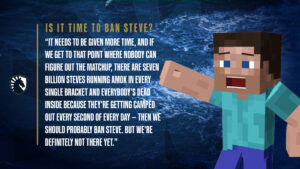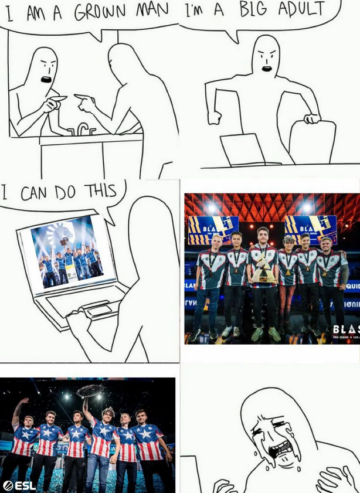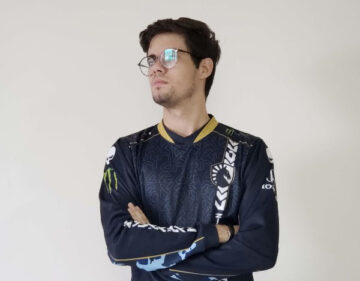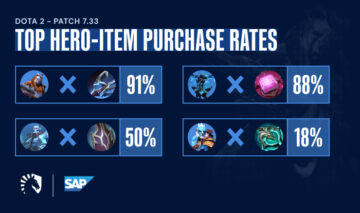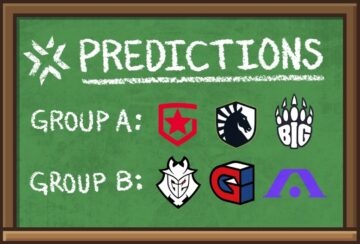or: How I learned to stop worrying and love Dwarf Fortress
Over the past two decades, gaming has become one of the largest hobbies in the world. As video games expand from niche to nearly everywhere, they’ve started taking on not only new genres, but new roles in people’s lives. In particular, whenever I glance at the Steam store page — or a Nintendo Direct — I find a lot more “comfort games” in the vein of Animal Crossing, Breath of the Wild, Stardew Valley, Coffee Talk, Unpacking, etc. To point where, now more than ever, games feel like a mental health tool of their own.
In that spirit, and the spirit of Mental Health Awareness Month, I set out to find the favored “comfort games” within Team Liquid. To ask what games TL staff unwind to — and why? It felt particularly interesting to me because as an esports org, we’re an inherently “sweaty” entity. And TL especially has a tryhard culture to it, where we aim for the top in most esports — and a lot of content fields as well. How do the most “try” of the tryhards unwind?
I expected a great deal of cozy, cute, life-sim experiences like Animal Crossing, but the answers I got were so varied and wild that I became very curious, very quickly. In fact, my own answer puzzled me! Recently, I’d found that Dwarf Fortress, an old city builder known for being deliberately hard and not-always-intuitive, was giving me loads of comfort at the end of long days.
Being baffled even by my own choice, I started asking what makes a game comfortable, or mentally relaxing, in the first place. Is it all purely personal and mental and bizarre? Are there any unifying factors behind it? That’s what I sought to find out.
It’s deeper than you think
Before anything, I want to say it’s deeper than you think. (Or at least, deeper than I thought!)
The most-picked games from our staff members probably won’t surprise you. Stardew Valley came in first, Minecraft in second, and Animal Crossing in third. What might surprise you, though, is by how little these titles made the podium.

I’d expected the top game would get at least a quarter of the votes alone. But the top three games had just under a quarter of the total votes when all put together! (14 of a total 59) There were three more titles tied for fourth — Breath of the Wild, Pokémon, and Teamfight Tactics. Throw them in and you’ve got 23 of 59 — still well under half. Across the whole survey, there were over 35 unique responses!*
If this shit were an election, we’d either be headed to a run-off, or to a very weird parliament (where Stardew Valley would lead a presumably very agrarian, very cozy coalition). In years past, I feel this race would’ve been a lot less multifaceted. In the mid-2000s’s, you’d likely have a battle between Animal Crossing and Harvest Moon. But since then, the very genre of “cozy game” has deepened and grown a lot.
When I was growing up, video games were a primarily “sweaty” affair. In the early-early days of the arcade, games were intentionally over-difficult in order to suck up your quarters. (To the point where some were carnival scams in 8-bit.) But even as games went to consoles and relaxed on difficulty, you were often sweating it out against friends in a way-too-heated party game or against the clunky controls and baby-babble visual language of a 1st or 2nd generation platformer.
The notable comfort games like Harvest Moon and Animal Crossing were more exceptional than normal. They were also more drawn up on gender lines — as, in the 90’s, only women were allowed to feel cozy and only men were allowed to be competitive. And frankly, even the comfort games were sweatier and less friendly back then — anyone who’s had a run-in with GameCube Tom Nook or Resetti knows this!
[embedded content]
(Polygon’s Simone de Rochefort has a good breakdown on the nice-ification of Nook.)
Nowadays, gaming isn’t so much less sweaty as it is more diverse in its purposes. Even the most competitive of gamers probably dabble in the cozy and have a save file in Stardew Valley or Animal Crossing or some darling indie title. (You have never heard of this indie title in your life but there are 3,000 video essays on YouTube about it.)
So, some of the diversity in response comes from gaming being a broader hobby. But there’s even more to it than gaming — as entertainment media — deepening. There’s also the fact that “comfort” is an ocean-trench-deep word. There’s a lot to what can make someone feel comfortable — and the answers reflect that.
What is your comfort game? AKA a game that you play to unwind, reset, or help your mental health?
(This is the primary question in our survey and I think the way that we phrased the question gave room for interpretation too.)
Sure, we’ve got a number of deliberately designed comfort games in there (Unpacking, Sims, and Power Washing Simulator to name a few), but we’ve also got a number of pretty weird, hard to explain choices. (Like Hollow Knight, Slay the Spire, Dwarf Fortress, Hearts of Iron 4, Chivalry 2, and Mary-Kate and Ashley: Sweet 16 – Licensed to Drive. (More on that last one later.)
Luckily, we also asked our coworkers to explain why they picked the games that they did. I dug through the “why?” of the survey for common words and then expanded out into common sentiments (removing some that were self-explanatory to the point of not telling me much — like relaxing or comfortable).
Digging through the “why,” I found four pretty clear factors or elements that united a lot of individual responses and different titles.
- Focus
- Familiarity
- Versatility
- Music
I’ll go through each of these elements, explain how I found them, and some of the lessons they taught me about not only video games, but how video games can help you patch the holes in your brain.
Focus (or lack thereof)
Of all the factors that went into comfort, the idea of “focus” got the most mentions (24), but in the sense of “No focus, please. I’d like to become an invertebrate right now.”
What’s surprising is that not even a solid majority wanted a completely “head empty” focus-less experience. A lot of people found comfort in a Goldilocks level of focus — just enough focus to keep your mind off of the real world without having to strain to understand the digital one. Nailing that right level of focus can make or break whether or not a game is an actual escape — and explains a good deal of variance right off the bat.
Breath of the Wild is one of the most-picked games on this list — and I’d venture a lot of lists. But I personally find the game stressful because I often need to focus to figure out where to go or how to steer the lock-on combat system. Open worlds stress me out in general because there’s no focus point. My pick, Dwarf Fortress, comes partly because of the aforementioned holes in brain, but partly because the game gives me problems and projects that have clear focal points, tasks, and priorities. That helps guide my focus more than an open world, less than an FPS or action title, and right where I want it to be.
The winning game of the survey — Stardew Valley — got a note nodding to focus in nearly every submission. “You don’t have to think that much.” “It helps me turn my brain off. It’s a really simple game…” “You don’t need to be 100% focused or work hard.” “Not too much brain power, cute aesthetic, some kind of stakes but not overwhelming.”
That last comment comes from Shihab, one of our Graphic Designers. He’s one of several to use the term “stakes.” The idea of “stakes” came up a lot in tandem with focus (as well as versatility). Plenty of folks wanted no or low stakes but others wanted some stakes — usually enough to give them a reason to get immersed, get into that “just right” zone of focus, and forget the world for a while.
Speaking of getting in the zone, though no one used the term in the survey, I think there’s an element of casual flow state within comfort games. For the uninitiated, that’s a state you enter where much of the world and self falls away and your brain commits fully to whatever it’s doing. People often link flow to intense and competitive tasks, but more than intensity of activity, the rough psychological consensus around flow is that you hit it when the level of challenge is just right. That’s part of why I think we got such a wide range of games — and also why we got some seriously tryhard titles like Hollow Knight, Slay the Spire, Hades, and “any Metroidvania.”
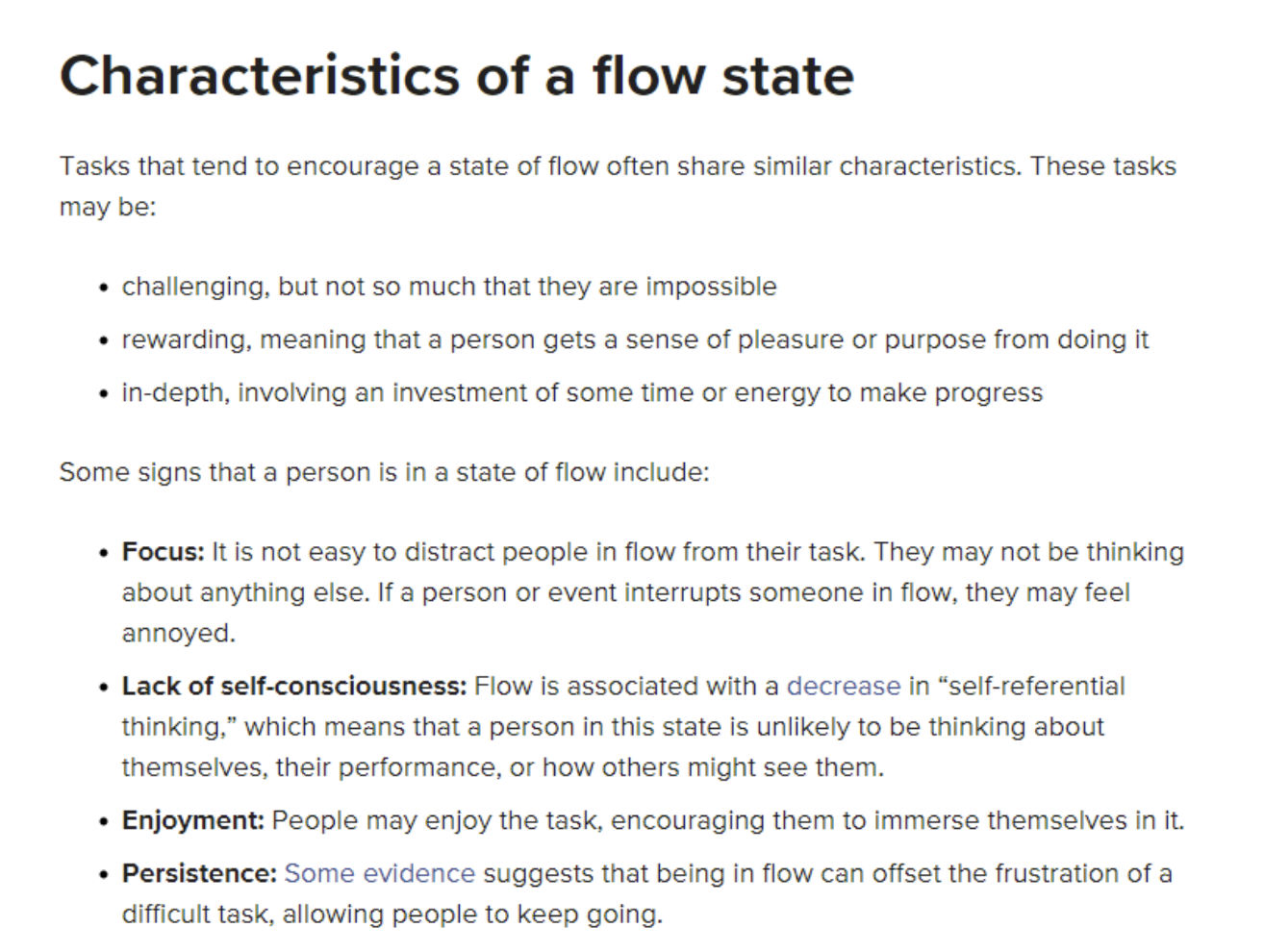
(A quick primer on flow state courtesy of Medical News Today.)
These tryhard titles, in the right hands, can be peculiarly escapist because a flow state is very escapist! In the article cut-out above, you can see that in flow state a person has less “thinking about themselves, their performance, or how others might see them.” That’s pretty sick, because those are like three of my “Top 5 Favorite Thoughts to Escape From.”
Joey, our Executive Producer and one of the hardest workers I know, gave a very apt answer. When asked what made Slay the Spire a good comfort game, he said, “It’s not. It just allows me to focus my energy and stress into something else and it fully consumes my brain so I absolutely can not think about work when playing.”
That’s some grade-A escapism! “Escape” itself got enough mileage that I thought to make it a factor. But like “cozy” or “chill” or “relaxing,” it felt simultaneously too vague and too self-evident. But within the “escape” responses, I did find a surprising lot about focus — low, middle, and high.
It’s also worth noting that, across the great difficulty range of submissions, most games still had a relaxed fail-state. For example, FromSoft titles got no votes, but games with quick-resets like Chivalry or even CoD or Halo got some mentions. I’d argue this is a big part of why TFT is the only competitive game that got high on this list. It’s a game that has pretty adjustable levels of focus, and a much more relaxed fail-state than normal because you don’t have to place first — you could be second, third, hell you could be fourth.
[embedded content]
Familiarity
“Familiarity” might sound more familiar as nostalgia — and that had to be one of the most-used words in the survey. Turns out there’s a lot of comfort in turning back time. Coming in as the second most common factor by a hair over versatility (16 to 15), I termed it familiarity because it’s not only about a game giving a sense of the past, but knowing a game really well.
“I do find myself returning to Hollow Knight quite a bit.” Bonnie, our Copywriter, explained. “It probably isn’t a good comfort game for most people because it’s, well, a Soulslike, but I’ve played it enough times that the difficulty doesn’t really factor into it anymore. The world, music, and characters are so well-crafted and familiar to me at this point that it always makes me feel better to return to them.”
There’s something to be said about not only escaping this world but going to another one where you feel comfortable. Pretty much all of the top 3 picks had some element of familiarity in their responses. Minecraft especially got points for nostalgia, with a few staff members calling it their first big game — and making me feel terribly old in the process. Stardew Valley did just as well though, simply for the feel created by its pixel graphics.
Familiarity contributed plenty to the wide breadth of response too, because it opened the door for a number of old and unexpected titles. RaiShaun, our Senior Creative Coordinator, put down any Final Fantasy game because he “care[s] so much for the characters.” A handful of people put down MMOs — particularly, Old School Runescape — due to nostalgia. Active MMOs are some of the oldest still-living game titles you’ll get.
And then, unexpectedly, there were the old simulators and builders. Pharoah, Zeus and Poseidon, The Sims, Dorfromantik, and my own Dwarf Fortress.
It’s easy to forget that the city simulator was one of the oldest genres of games ever created — with roots going all the way back to The Sumerian Game in 1964. Seeing the old city builders on the survey reminded me that I grew up with Sim City and Caesar too. (As well as other simulators like Zoo Tycoon, Rollercoaster Tycoon, and, of course, the Sims). And then, reading younger staff talk about Minecraft, I felt a small wonder at the way the history of games rhymed. It also helped explain why Dwarf Fortress, a game that has a mechanic called the “tantrum spiral,” felt so comfortable to me. In a crucial way, it really is a return to the past. Then, in another crucial way, it’s a dip into another world full of weird little dwarves who I am very familiar with (and usually rooting for).
Of course, flat-out nostalgia still plays the biggest role in familiarity. But nostalgia too, can be really deep. Meaghan, our Manager of People and Culture, probably showed this best when she gave the most left-field answer of all: Mary Kate & Ashley Sweet Sixteen Licensed to Drive.

(You know a Wikipedia page is gonna be great when there’s a “Lawsuit” section.)
“Party/board game style GameCube game,” Meaghan writes. “Nostalgic, think Mario Party but for millennials who watched every Mary-Kate and Ashley movie at least 10 times and thought being 16 meant being an adult.”
I was so intrigued by this hyper-specific answer that I had to follow up. Meaghan told me she still does play the game on a GameCube (the physical game disc is now 20 years old). What’s more, she revealed a way that games can be comforts that I had not considered at all.
“Playing by myself I always knew I could win so I never felt a lot of pressure but if I was playing with my sister the chance for tears and screaming was very high. Now, as an adult, I just think about how happy the game always made me. And remembering playing with my Dad, who passed away when I was 12, just makes the game so much more special and honestly calming — even if I get beat by the Olsen twins in a game of red light green light.”
Versatility
There’s a power to familiarity that’s obvious, even if it is deep and difficult to express. Versatility, on the other hand, felt less obvious. What a lot of people very explicitly valued in their comfort picks, was the option to play them in different ways.
“Stakes” came up a lot in versatility too — but less as “no stakes” and more as “I can pick the stakes.” Likewise, there were a ton of answers that nodded to being able to do what you like, on top of setting difficulty. The MMOs, sandboxes and open worlds made good on versatility, the majority of their entries getting some mention of versatility. Old School Runescape and Minecraft seemed to embody the idea.
“It really allows the player to be as dedicated and focused as they want to be,” Alex, our Video Editor, wrote of Runescape. “You can go through and do endgame bossing and raids or just relax and do some mindless fishing. Within each skill, you can also train as demanding or as AFK as you want. In no other game that I have played has there been so much choice and diversity in ways you can play the game.”
An anonymous staff member spelled the same idea out well for Minecraft. “Minecraft has no limits, no rules, and no consequences to failure. It’s so simple and yet so vast. A true oasis to me, I can do whatever I want, and I can even do it with my friends.”
However, a game doesn’t have to be fully open and off-rails to be versatile. Aditi, one of our Social Media Managers, picked Hitman because, “it is an objective-oriented game but still involves multiple possibilities of solving the same problem/ reaching an objective. I enjoy the flexibility.” We got similar answers for submissions like Hades and even though versatility didn’t show for Breath of the Wild, I’m always struck by how much random bullshit the game lets you get away with.
[embedded content]
(YouTube Razbuten has a great series of video essays about gaming as a non-gamer. He points to the versatility in solutions as a reason why Breath of the Wild is more accessible than most titles.)
I had to admit, even Dwarf Fortress had strong versatility elements to it. The game’s world generator alone is powerful enough to give you many ways to play. And then, even within a single fort, I find I can concentrate on any number of projects — whether it’s exploring the cavern full of troglodyte blood or making a little hat for every dwarf.
I think versatility is also key to understanding why competitive, esportsy titles don’t feel very comforting, even for players who do want focus and socialization. These games — especially team-based ones — demand compromise, whether it’s to teammates, the meta, or raw time constraints (the 40+ minute LoL or Valorant affair). I think TFT was the most-comforting of the competitive games in part because it has more versatility too — the people who picked it liked it for being mobile, low-stakes and fairly okay with you going AFK.
Music
Last but not least. Music got the least mentions of the categories but it’s also the clearest of them all. I had to do no finagling or sentiment wrangling to put this one together. The majority of the responses for Minecraft, Breath of the Wild, and Stardew Valley mentioned the soundtrack, music, or OST — and when most people spoke about the idea of a good comfort game, they spoke about it having relaxing tunes.
Right away, it reminds me of a quote I’d heard from musician Woodkid, who heard it from legendary composer Phillip Glass. “Music always wins over image. It always wins. If you take a nice, cute image but you put very frightening music on it, the general feeling of what you see is gonna be frightening. […] It will change its meaning. It never works the other way around. An image will never make sad music happy.”
[embedded content]
(The quote comes from Hideo Kojima’s podcast, Brain Structure, which incidentally is also great comfort media. Koijma has a constant, earnest love for life in the podcast, which makes it oddly affirming.)
True to Glass’s theory, music not only set the tone for a lot of comfort games on this list but also beat out mentions of aesthetic or cuteness! Music often did come in as the closing thought, thrown in at the end, but I think that’s because, “and don’t forget about the OST!” makes for a good bookend. I mean, there’s not much else to say about good music, right? Especially in the case of an OST, when it works, you just feel it.
Feel it
I’ll admit too that there were almost certainly other things that could be as important as the four factors above. But I didn’t pick these four in order to be correct. When it comes to something as individual and odd as comfort — and to feelings writ large — “correct” doesn’t mean much.
I think that most people consider the correct comfort game to be cute, slow, and non-competitive by default. But many of the games my coworkers listed totally shattered that mold. The raw variety alone showed just how dynamic and strange it is to find comfort as a human being. Going in, I wanted to find ways to unite and understand that varied weirdness — and truthfully, to understand my own weird pick. In the end, I found four pretty good reasons. But more important than that, I found that when it comes to comfort, you just gotta feel it.
Beyond music, there were a lot of factors people mentioned that were even more intuitive and simple. Such that I didn’t feel they had enough meat to them to be worth going over. Or a lot of factors that only had a few mentions or felt fairly self-evident. I wanted to go over a few of these in an extra “other stuff” section for anyone interested.
Aesthetic/cute: Cute games feel more comforting! Aesthetics of some kind got brought up enough that I considered putting them in as a fifth element. But it’s hard to say much about aesthetics because it’s pretty obvious that cute things and soft visuals often make people feel more at ease. In a sense it’s a “just gotta feel it” category, akin to music, and I only wanted one of those kinds of categories in the article (which had already grown over-long). I chose to highlight music instead because there were more tallies for it and a bit more to say about it.
Still, there were a few interesting details inside aesthetics. For example, while most people did like cute aesthetics, plenty of people also liked games with low aesthetic value, or violent visuals (Chivalry, Halo, CoD, Hitman, Red Dead Redemption). Aesthetics also played into familiarity, with 8-bit styles becoming synonymous for “cozy” and “nostalgic.” I also remember hearing once that baby mammals are very cute as an evolutionary feature. In essence, babies are naturally pretty annoying and demanding, so a layer of cuteness helps to make sure the parent doesn’t just abandon them. I sometimes wonder if that weird evolutionary feature seeps into the myriad cute aesthetics of our comfort games.
Slow: In an increasingly fast-paced world, plenty of the staff valued slow-paced games with no time pressure. (Animal Crossing in particular had the slow vibes down pat). Slow is often synonymous with chill, so it felt a bit obvious. But more than being obvious, what made me reluctant to give it a full section is that a good number of people preferred fast games, where much of it came down to the reflexes instead of the brain.
Nikolas, a member of our tech team, wrote in Wreckfest — an outright racing game. “Don’t have to think much,” he led. “Mostly reaction based. Doesn’t take too much attention but also enough attention to keep your mind from racing about other things. Bonus if it allows you to get out aggression. Another bonus if you can play w/ friends. Needs to be fun but not addictive.” Like focus, it seems that the speed is mostly a matter of what pace turns the brain off.
Not addictive: Nikolas was the only person to put a racing game, but not the only person to draw a line at “addictive.” Interestingly, people wanted to be immersed and transfixed and focused but explicitly “not addicted.” I couldn’t flesh this out too much because it didn’t get more than ten mentions — and no mention was terribly thorough. But I do find it curious! My best guess is that addicting games become stressful in their own way, accidentally overstaying their welcome and forcing you to use your willpower, when you’d rather not use any mental faculty.
Not competitive: I covered this some in versatility, but most people wanted hardly any competition in their comfort games. They still wanted challenge — to wildly varying degrees — but not competition, and said so directly. That’s also pretty natural, given how competitive the world is and how competition can be challenging, intense, and way too self-reflective. But I did wonder if TL employees — and esports people in general — were especially keen to avoid the competition. Working in esports definitely changed how the ranked queues felt for me.
Beyond these three, there were some other interesting spare ideas. A small but notable niche of people found comfort in playing with friends and needed that for their games. Apex Legends, Fall Guys, and Fortnite all made it on friendship. Other people preferred very meditative and deep stories and mentioned the quality of the narrative specifically. No doubt, a good story helps breed some familiarity too.
Writer // Austin “Plyff” Ryan
Graphics // Stacey “Shiroiusagi” Yamada
- SEO Powered Content & PR Distribution. Get Amplified Today.
- PlatoAiStream. Web3 Data Intelligence. Knowledge Amplified. Access Here.
- Minting the Future w Adryenn Ashley. Access Here.
- Buy and Sell Shares in PRE-IPO Companies with PREIPO®. Access Here.
- Source: https://www.teamliquid.com/news/2023/05/09/whats-in-a-comfort-game
- 000
- 10
- 12
- 14
- 15
- 1st
- 20
- 20 years
- 23
- 24
- a
- able
- About
- above
- absolutely
- accessible
- across
- Action
- active
- activity
- aesthetic
- aforementioned
- Against
- aim
- Aka
- alex
- All
- allowed
- allows
- alone
- already
- also
- always
- am
- an
- and
- Animal Crossing
- anonymous
- Another
- answer
- any
- anymore
- anyone
- Anything
- apex
- Apex Legends
- APT
- Arcade
- ARE
- around
- article
- as
- At
- attention
- avoid
- awareness
- away
- Baby
- back
- based
- BAT
- Battle
- BE
- became
- because
- become
- becoming
- been
- behind
- being
- BEST
- Better
- between
- BIG
- Biggest
- Bit
- blood
- bonus
- breadth
- break
- Breakdown
- broader
- brought
- builder
- builders
- but
- by
- called
- calling
- came
- CAN
- carnival
- case
- casual
- categories
- certainly
- challenge
- challenging
- chance
- change
- changed
- characters
- Chivalry 2
- choice
- choices
- chose
- City
- city builder
- clear
- COD
- Coffee
- combat
- come
- comes
- coming
- comment
- Common
- competition
- Competitive
- compromise
- concentrate
- Consensus
- consequences
- Consider
- considered
- Consoles
- constant
- constraints
- content
- contributed
- controls
- Coordinator
- correct
- could
- course
- covered
- created
- Creative
- Credits
- crucial
- Culture
- Curious
- Cute
- darling
- days
- De
- dead
- deal
- decades
- dedicated
- deep
- definitely
- Demand
- demanding
- designed
- designers
- details
- DID
- different
- difficult
- difficulty
- digital
- direct
- directly
- diverse
- Diversity
- do
- does
- doing
- don
- door
- DOTA2
- Doubt
- down
- draw
- drive
- due
- Dwarf Fortress
- dynamic
- ease
- easy
- editor
- either
- Election
- element
- elements
- embedded
- employees
- end
- energy
- enjoy
- enough
- Enter
- Entertainment
- escape
- especially
- esports
- essence
- etc
- even
- EVER
- Every
- Everywhere
- Example
- exceptional
- executive
- executive producer
- Expand
- expected
- experience
- Experiences
- explain
- explained
- explains
- Exploring
- factor
- Factors
- Failure
- Fall Guys
- familiar
- familiarity
- FANTASY
- FAST
- fast-paced
- favorite
- Feature
- feel
- few
- Fields
- Figure
- Final
- Final Fantasy
- find
- First
- first place
- Flexibility
- flow
- Focus
- focused
- follow
- For
- Fort
- Fortnite
- Fortress
- four
- FPS
- friendly
- Friends
- Friendship
- from
- full
- fully
- fun
- game
- GameCube
- Gamers
- Games
- Games Like
- Gaming
- Gender
- General
- generation.
- Generator
- Genre
- genres
- Get
- getting
- give
- given
- gives
- Giving
- glance
- Glass
- go
- going
- good
- graphics
- great
- Green
- Growing
- grown
- guide
- had
- Hades
- Hair
- half
- Halo
- hand
- hands
- happy
- Hard
- harvest
- has
- hat
- Have
- having
- he
- headed
- Health
- hearing
- Hearts
- help
- helped
- helps
- High
- Highlight
- history
- HIT
- Hobbies
- hollow knight
- Honestly
- How
- How To
- HTTPS
- human
- i
- idea
- ideas
- if
- image
- immersed
- important
- in
- increasingly
- Indie
- individual
- INSIDE
- instead
- interested
- interesting
- into
- intuitive
- Is
- isn
- IT
- ITS
- itself
- just
- keep
- Key
- kind
- know
- known
- lack
- language
- large
- largest
- last
- later
- layer
- lead
- learned
- least
- Led
- Legendary
- Legends
- less
- lessons
- Level
- levels
- licensed
- Life
- light
- like
- limits
- Line
- LINK
- Liquid
- List
- listed
- Lists
- Little
- lives
- loads
- LoL
- Long
- lot
- love
- Low
- made
- Majority
- make
- MAKES
- Making
- manager
- managers
- many
- Mario
- matter
- mean
- meaning
- Meat
- Media
- member
- Members
- Men
- Mental health
- mentions
- Meta
- Metroidvania
- Middle
- might
- Millennials
- Minecraft
- minute
- Mobile
- Month
- Moon
- more
- most
- mostly
- movie
- much
- multiple
- Music
- Musician
- name
- narrative
- Natural
- nearly
- need
- needed
- needs
- never
- New
- news
- Nice
- Niche
- Nintendo
- Nintendo Direct
- no
- normal
- Nostalgia
- not
- notable
- now
- number
- Oasis
- objective
- obvious.
- Odd
- of
- off
- often
- Okay
- Old
- oldest
- on
- once
- One
- ones
- only
- open
- Open World
- Option
- or
- order
- Other
- Others
- our
- out
- over
- own
- pace
- page
- Parliament
- part
- particular
- particularly
- Party
- Past
- Patch
- People
- performance
- personal
- personally
- physical
- pick
- Picked
- Pixel
- place
- Platformer
- plato
- plato data intelligence
- platodata
- platogaming
- play
- player
- players
- Playing
- plays
- please
- Plenty
- podcast
- podium
- Point
- Points
- possibilities
- power
- powerful
- pressure
- pretty
- primarily
- primary
- primer
- probably
- problems
- Process
- producer
- projects
- purposes
- put
- putting
- quality
- quarter
- question
- quick
- quickly
- quite
- Race
- racing
- range
- Ranked
- rather
- Raw
- reaching
- reaction
- Reading
- Real
- real world
- really
- reason
- reasons
- recently
- red
- Red Dead Redemption
- Relax
- Remember
- remembering
- removing
- response
- responses
- return
- Revealed
- right
- role
- roles
- rollercoaster
- room
- roots
- rules
- RuneScape
- s
- Said
- same
- Sandboxes
- save
- say
- scams
- School
- second
- section
- see
- seeing
- seems
- senior
- sense
- sentiment
- Series
- set
- setting
- several
- she
- show
- similar
- Simple
- Simply
- sims
- simulator
- since
- single
- sister
- skill
- small
- So
- Social
- social media
- solid
- Solutions
- Solving
- some
- something
- sound
- Soundtrack
- special
- specifically
- speed
- staff
- stakes
- Stardew
- Stardew Valley
- started
- State
- Steam
- still
- store
- Stories
- Story
- stress
- strong
- structure
- style
- Styles
- such
- surprise
- surprising
- Survey
- sweet
- system
- tactics
- Take
- taking
- talk
- Team
- Team Liquid
- Teamfight Tactics
- TeamLiquid
- tech
- TFT
- than
- that
- The
- The Game
- The Sims
- the world
- their
- Them
- themselves
- then
- there
- These
- they
- things
- think
- third
- this
- those
- though
- thought
- three
- Through
- time
- times
- Title
- titles
- TL
- to
- together
- Ton
- too
- tool
- top
- total
- Train
- tunes
- turn
- turning
- turns
- Twins
- two
- tycoon
- under
- Understand
- understanding
- unique
- United
- Unwind
- up
- use
- used
- usually
- Valley
- VALORANT
- value
- valued
- variety
- vast
- ve
- venture
- versatile
- very
- Video
- video games
- visuals
- votes
- want
- was
- washing
- way
- ways
- we
- welcome
- well
- were
- What
- when
- whenever
- where
- whether
- while
- WHO
- whole
- why
- wide
- wide range
- Wikipedia
- will
- win
- winning
- Wins
- with
- within
- without
- Women
- words
- Work
- workers
- working
- works
- world
- Worlds
- worth
- would
- Wreckfest
- years
- yet
- you
- your
- youtube
- zephyrnet
- Zoo Tycoon


